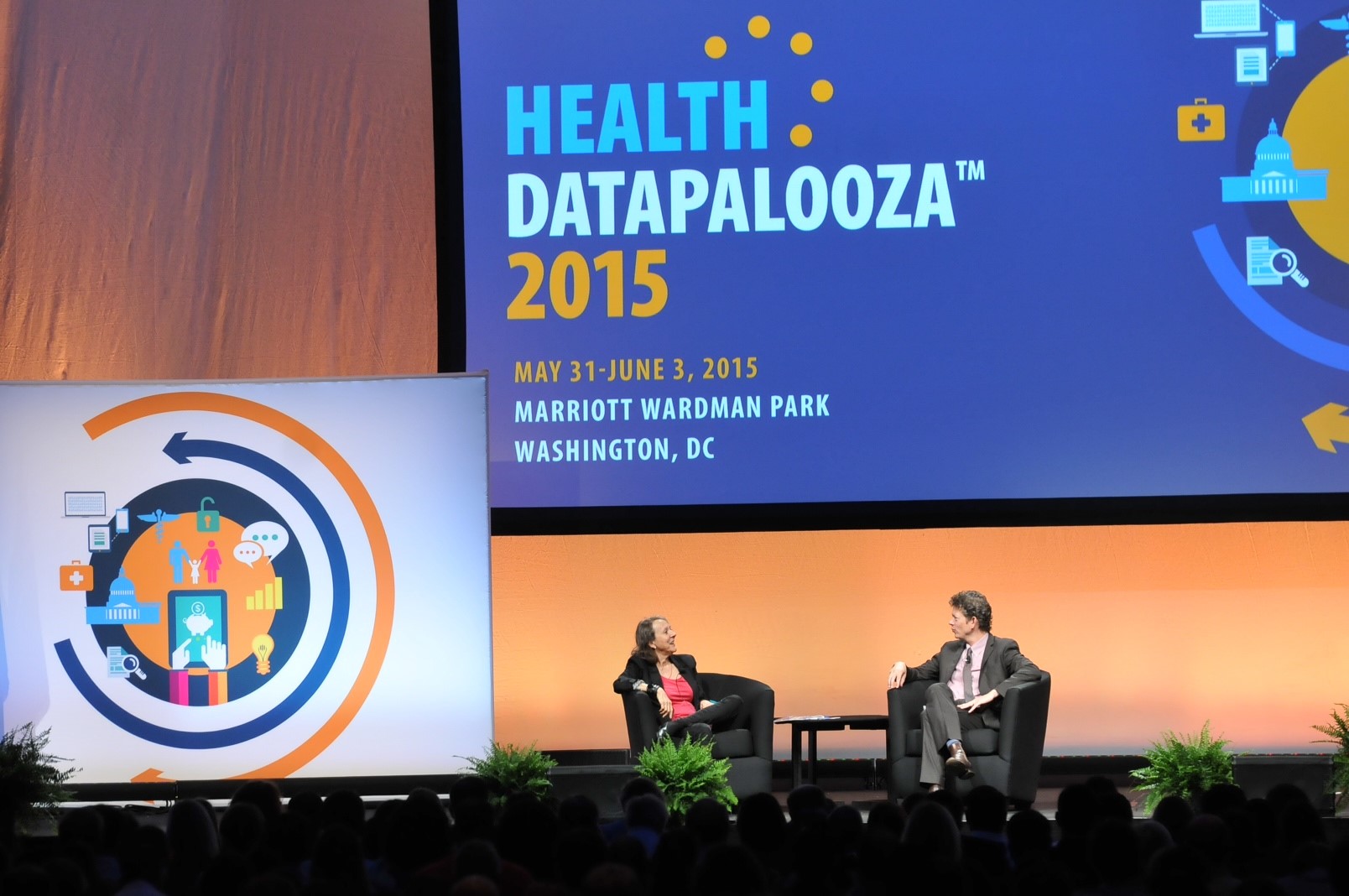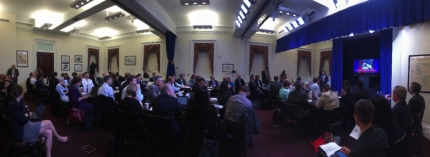Office of Science and Technology Policy Blog
Upping Our Game for Disaster Preparedness and Response
Posted by on June 3, 2015 at 10:05 AM ESTLast Thursday the President was in Miami for the 2015 Hurricane Briefing at the National Oceanic and Atmospheric Administration (NOAA)’s National Hurricane Center. Briefing topics included forecast details for the coming hurricane season as well as an overview of technology, tools, and teams supporting preparedness and response efforts led by NOAA, the Federal Emergency Management Agency, the Department of Defense, and other Federal, state, and local entities.
The briefing covered resources like the Administration’s Climate Resilience Toolkit, a website that provides centralized, authoritative, easy-to-use information, tools, and best practices to help communities prepare for and boost their resilience to the impacts of climate change. For instance, the Climate Resilience Toolkit’s Coastal Flood Exposure Mapper tool creates visualizations that overlay projections of future sea level rise with the locations of critical infrastructure in coastal areas, helping users to target preparedness and response efforts to high-priority areas.
The Climate Resilience Toolkit is one example of the resources that individuals and organizations rely on for effective disaster preparedness and response. In the aftermath of Hurricane Sandy, in October 2012, the Federal government made it a priority to improve such resources by expanding engagement with a broad range of community members to contribute their talents, needs, unique skills, and perspectives in building tools and sharing information before, during, and after a crisis. This led to the April 2013 launch of the White House Innovation for Disaster Response and Recovery Initiative — a government-wide effort to strengthen our ability to cope with disasters.
Since then, the Administration has continued to work collaboratively in the area of community engagement and crowd-sourced innovation to develop #disastertech resources to enhance our disaster preparedness and response capabilities.
Learn more about Energy and Environment, , TechnologyHealth Datapalooza 2015: Liberating Data and Transforming Health Care
Posted by on June 3, 2015 at 8:19 AM ESTFive years ago, people asked what would happen if we brought together developers, startups, entrepreneurs, policymakers, and industry leaders together around a common goal of open health data. The result was the first Health Datapalooza, which attracted about 45 people. This week, the sixth Health Datapalooza is bringing together more than 2,000 participants for four days of events demonstrating new, diverse health innovations that are made possible by collaboration around open data.

Fireside chat with Esther Dyson and Thomas Goetz at this year's Health Datapalooza. (Photo credit: Health Data Consortium).
We’re on the precipice of a dramatic democratization of health data access. The mission of the U.S. Chief Data Scientist and team is to responsibly unleash the power of data for the benefit of the American public and maximize the nation's return of its investment on data. Data is one of the most effective mechanisms to empower and activate citizens to become true partners in their own care team. This year’s Health Datapalooza highlights many promising stories of patients generating data from non-traditional sources like wearable technologies, environmental sensors, and social media to create a more complete picture of their health.
Learn more about Health Care, , TechnologyThe Value of Basic Research
Posted by on June 2, 2015 at 4:27 PM ESTPeople’s appreciation of game-changing new technologies frequently ignores the long, often twisting path that transforms an idea from fundamental discovery to practical application. Those who pay for the national research agenda may not always be aware of the early and fundamental work that makes today’s technologies possible. For example, it was basic research presented in a then-obscure scientific paper by Albert Einstein in 1917 that ultimately translated into the invention of laser technology four decades later. The development of similarly groundbreaking technologies that promise to transform and improve our lives hinges on our investments in fundamental, curiosity-driven research today.
But basic science has long been under fire. Between 1975 and 1987, the “Golden Fleece Award” was established and bestowed upon projects they deemed “the biggest, most ridiculous or most ironic example of government spending or waste.” Often, the “winners” were Federally funded scientific research projects taken out of context and cited without explanation.
Learn more aboutThe White House Grounds Have a New Feathered Visitor!
Posted by on June 1, 2015 at 5:59 PM ESTIf you’re planning on being near the White House sometime soon, use your eagle eye to spy a hawk!
This week, I, along with others at and around the White House have been enjoying the company of what appears to be a young red-tailed hawk that has taken a liking to the White House grounds. Check out the great photo below that U.S. Chief Data Scientist and Deputy Chief Technology Officer DJ Patil was able to snap of our feathered friend:
Learn more about Energy and EnvironmentAccelerating Development of New Technologies for Veterans
Posted by on May 29, 2015 at 12:11 PM ESTImagine losing your ability to use everyday objects like your phone, computer, or microwave. Imagine not being able to continue a beloved hobby, such as photography. These are some of the challenges faced every day by many of our nation’s Veterans.
In an effort to bring together diverse individuals to gather and crowdsource ideas surrounding personalized technologies to better care for our Veterans, the Department of Veterans Affairs (VA) is hosting the first VA Innovation Creation Series for Prosthetics and Assistive Technologies. Powered by the VA Center for Innovation, this initiative aims to facilitate the development of tailored technologies to improve care and quality of life for Veterans and their supporters.
“VA has long been at the forefront of research and technology, discovering new ways to give our Veterans the best care possible,” said VA Secretary Robert A. McDonald. “We’re reaching out to technology leaders in the corporate world and to the public in order to find creative new solutions to help transform care and quality of life not only for our Veterans, but for the public at large. The innovations that come out of this challenge will benefit the Veterans we care for and will be open source to help advance American medicine.”
Meet some of the incredible Veterans that inspired this challenge.
Calling all engineers, designers, and problem solvers – join us in tackling this challenge to make life easier for differently-abled Veterans and their supporters!
Learn more about Energy and Environment, , TechnologyCitizen Cartographers Unite: Report from the First White House Mapathon
Posted by on May 28, 2015 at 2:10 PM ESTLast week, citizen cartographers joined the White House Office of Science and Technology Policy and Office of Digital Strategy for the first-ever White House Mapathon.
In just three hours, more than 80 mappers edited more than 400 roads and 1,000 buildings in OpenStreetMap, and collected power outage info on 152 power utilities. The mapathon focused on three main projects: humanitarian mapping efforts, mapping U.S. parks, and power outage mapping.
Learn more about , Technology
- &lsaquo previous
- …
- 3
- 4
- 5
- 6
- 7
- 8
- 9
- 10
- 11
- …
- next &rsaquo
White House Blogs
- The White House Blog
- Middle Class Task Force
- Council of Economic Advisers
- Council on Environmental Quality
- Council on Women and Girls
- Office of Intergovernmental Affairs
- Office of Management and Budget
- Office of Public Engagement
- Office of Science & Tech Policy
- Office of Urban Affairs
- Open Government
- Faith and Neighborhood Partnerships
- Social Innovation and Civic Participation
- US Trade Representative
- Office National Drug Control Policy
categories
- AIDS Policy
- Alaska
- Blueprint for an America Built to Last
- Budget
- Civil Rights
- Defense
- Disabilities
- Economy
- Education
- Energy and Environment
- Equal Pay
- Ethics
- Faith Based
- Fiscal Responsibility
- Foreign Policy
- Grab Bag
- Health Care
- Homeland Security
- Immigration
- Innovation Fellows
- Inside the White House
- Middle Class Security
- Open Government
- Poverty
- Rural
- Seniors and Social Security
- Service
- Social Innovation
- State of the Union
- Taxes
- Technology
- Urban Policy
- Veterans
- Violence Prevention
- White House Internships
- Women
- Working Families
- Additional Issues




